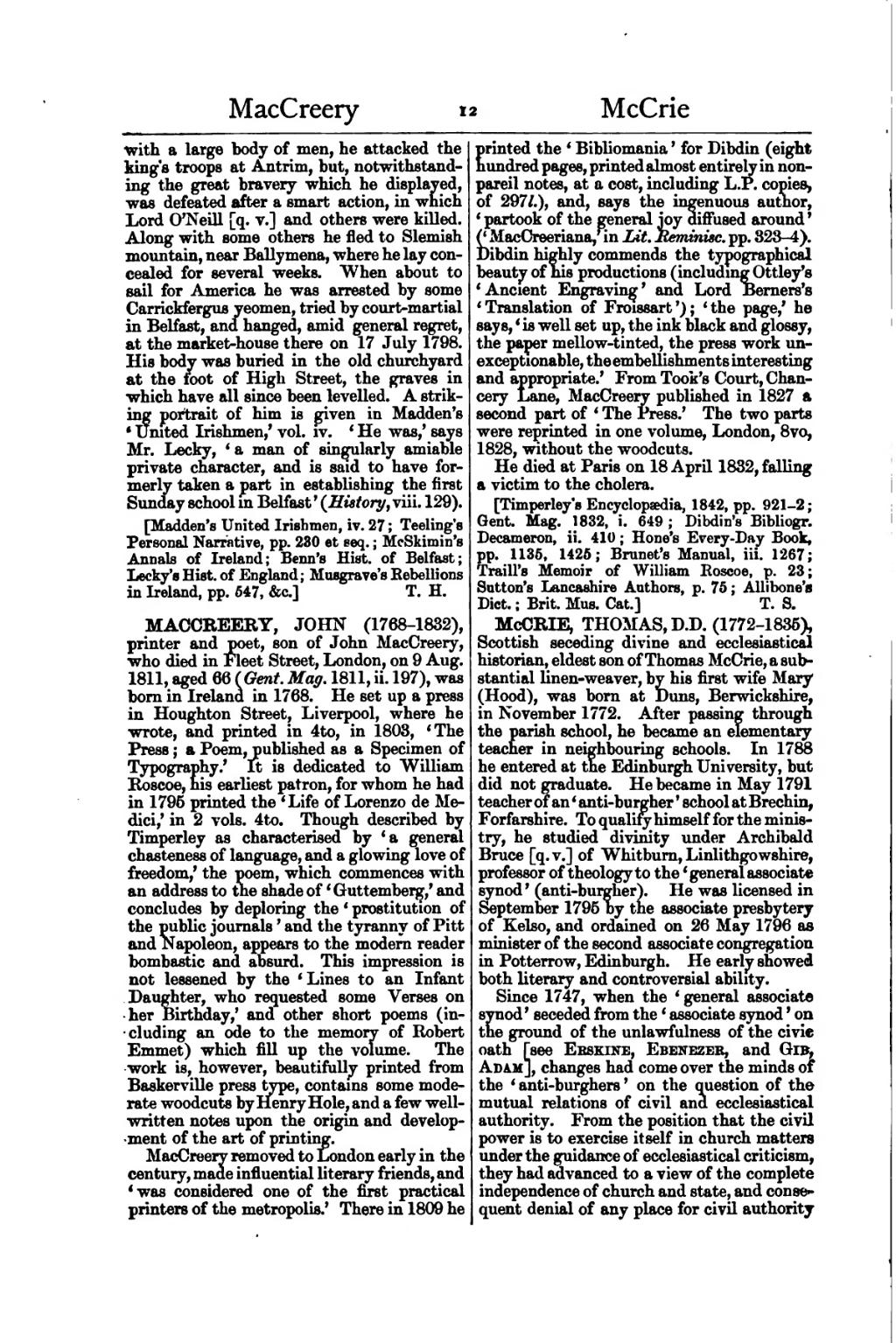with a large body of men, he attacked the king's troops at Antrim, but, notwithstanding the great bravery which he displayed, were defeated after a smart action, in which Lord O'Neill [q, v.] and others were killed. Along with some others he fled to Slemish mountain, near Ballymena, where he lay concealed for several weeks. When about to sail for America be was arrested by some Carrickfergus yeomen, tried by court-martial in Belfast, and hanged, amid general regret, at the market-house there on 17 July 1798. His body was buried in the old churchyard at the foot of High Street, the graves in which have all since been levelled. A striking portrait of him is given in Madden's 'United Irishmen,' vol. iv. 'He was,' say Mt. Lecky, 'a man of singularly amiable private character, and is said to have formerly taken a part in establishing the first Sunday school in Belfast' (History, viii. 129).
[Madden's United Irish Personal Narrative, pp. 27; Teeling's Personal Narative, pp. 230 at seq.; Mr Skimin's Annals of Ireland; Benn's Hist. of Belfast; Lecky's Hist. of England; Musgrave's Rebellions in Irelund, pp. 547, &c.]
MACCREERY, JOHN (1768–1832), printer and poet, son of John MacCreery, who died in Fleet Street, London, on 9 Aug. 1811, aged 66 (Gent. Mag. 1811, ii. 197), was born in Ireland in 1768. He set up a press in Houghton Street, Liverpool, where he wrote, and printed in 4to, in 1803, 'The Press; a Poem, published as a Specimen of Typography.' It is dedicated to William Roscoe, his earliest patron, for whom he had in 1796 printed the 'Life of Lorenio de Medici,' in 2 vols. 4to. Though described by Timperley as characterised by 'a general chasteness of language, and a glowing love of freedom,' the poem, which commences with an address to the shade of 'Guttemberg,' and concludes by deploring the 'prostitution of the public journals' and the tyranny of Pitt and Napoleon, appears to the modern reader bombastic and absurd. This impression is not lessened by the 'Lines to an Infant Daughter, who requested some Verses on her Birthday,' and other short poems (including an ode to the memory of Robert Emmet) which fill up the volume. The work is, however, beautifully printed from Baskerville press type, contains some moderate woodcuts by Henry Hole, and a few well-written notes upon the origin and development of the art of printing.
MacCreery removed to London early in the century, made influential literary friends, and 'was considered one of the first practical printers of the metropolis.' There in 1809 he printed the 'Bibliomania' for Dibdin (eight hundred pages, printed almost entirely in non-pareil notes, at a cost, including L.P. copies, of 297l.), and, says the ingenuous author, 'partook of the general joy diffused around (MacCreeriana. in Lit. Reminisc. pp. 323-4). Dibdin highly commends the typographical beauty of his productions (including Ottley's 'Ancient Engraving' and Lord Berners's 'Translation of Froissart'); 'the page,' he says, 'is well set up, the ink black and glossy, the paper mellow-tinted, the press work unexceptionable, the embellishments interesting and appropriate.' From Took's Court, Chancery Lane, MacCreery published in 1827 a second part of 'The Press.' The two parts were reprinted in one volume, London, 8to, 1828, without the woodcuts.
He died at Paris on 18 April 1832, falling a victim to the cholera.
[Timperley's Encyclopædia, 1842, pp. 921-3; Gent. Mag. 1832. i. 649; Dibdin's Bibliogr. Decameron, ii. 410; Hone's Every-Day Book, pp. 1135, 1425; Brunet's Manual. iii. 1267; Traill's Memoir of William Roscoe. p. 23; Sutton's Lancashire Authors, p. 75; Allibone's Dict.; Brit. Mus. Cat.]
McCRIE, THOMAS. D.D. (1772–1835), Scottish seceding divine and ecclesiastical historian, eldest son of Thomas McCrie, a substantial linen-weaver,by his first wife Mary (Hood), was born at Duns, Berwickshire, in November 1772. After passing through the parish school, he became an elementary teacher in neighbouring schools. In 1788 he entered at the Edinburgh University, but did not graduate. He became in May 1791 teacher of an 'anti-burgher' school at Brechin, Forfarshire. To qualify himself for the ministry, he studied divinity under Archibald Bruce [q.v.] of Whitburn, Linlithgowshire, professor of theology to the 'general associate synod' (anti-burgher). He was licensed in. September 1795 by the associate presbytery of Kelso, and ordained on 26 May 1796 as minister of the second associate congregation in Potterrow, Edinburgh. He early showed both literary and controversial ability.
Since 1747, when the 'general associate synod' seceded from the 'associate synod on the ground of the unlawfulness of the civic oath [see Erskine, Ebenezer, and Gib, Adam], changes had come over the minds of the 'anti-burghers' on the question of the mutual relations of civil and ecclesiastical authority. From the position that the civil power is to exercise itself in church matters under the guidance of ecclesiastical criticism, they had advanced to a view of the complete independence of church and state, and consequent denial of any place for civil authority
